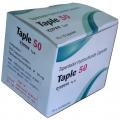Home / Categories / OPOTAB-50MG

OPOTAB-50MG
(10X10)
TAPENTADOL HCL-50MG
OPOID DERIVATIVES
MARUTI PHARMA PVT. LTD.
Product Details
TAPENTADOL HCL
Opioid analgesic for treatment of moderate to severe pain.
Indication
The immediate-release formulation of tapentadol is indicated for the relief of moderate to severe acute pain. The long-acting formulation serves as a continuous, around-the-clock analgesic that is indicated for the relief of moderate to severe chronic pain or neuropathic pain associated with diabetic peripheral neuropathy.
Associated Conditions
- Diabetic Peripheral Neuropathic Pain (DPN)
- Severe, Chronic Pain
- Acute, moderate Pain
- Acute, severe Pain
- Chronic, moderate Pain
Pharmacodynamics
Tapentadol is a centrally-acting synthetic analgesic. It is 18 times less potent than morphine in terms of binding to human mu-opioid receptors. It also increases norepinephrine concentrations in the brains of rats via inhibition of norepinephrine reuptake. Selective mu-opioid antagonists like naloxone can block analgesia from tapentadol. It also has not effect on the QT interval.
Mechanism of action
Tapendadol causes large increases in levels of extracellular norepinephrine (NE) due to a dual mechanism of action involving mu opioid receptor (MOR) agonism as well as noradrenaline reuptake inhibition.
Absorption
Bioavailability, immediate release (IR), 86 mg: 32%; Bioavailability, extended release (ER), 86 mg: 32%; Cmax, IR: 64.2 ng/mL; Cmax, ER: 22.5 ng/mL; T max, IR: 1.5 hours; T max, ER: 5.0 hours; Tapentadol accumulates following multiple repeat doses.
Volume of distribution
Following IV administration, volume of distribution is 540 ± 98 L.
Protein binding
~20%
Metabolism
97% of the dose is metabolized mostly via conjugation with glucuronic acid to produce glucuronides. Tapentadol is also metabolized into N-desmethyl tapentadol (13%) by CYP2C9 and CYP 2C19. CYP2D6 is involved in the formation of the metabolite, hydroxy tapentadol (2%). All metabolites are inactive.
Route of elimination
Tapentadol and its metabolites are excreted almost exclusively (99%) via the kidneys. Approximately 70% (55% O-glucuronide and 15% sulfate of tapentadol) is excreted in conjugated form. A total of 3% of drug was excreted in urine as unchanged drug.
Half life
Elimination half-life, IV: 4 hours.
Clearance
Total clearance = 1530 ± 177 ml/min.
Toxicity
Oral, rabbit: LD50 = 3200 mg/kg; Oral, mouse: LD50 = 300 mg/kg; Oral, rat: LD50: 980 mg/kg; The most common reasons for discontinuation due to adverse events were dizziness, nausea, vomiting, somnolence, and headache.
Affected organisms
- Humans and other mammals
SOURCE:DRUGBANK

